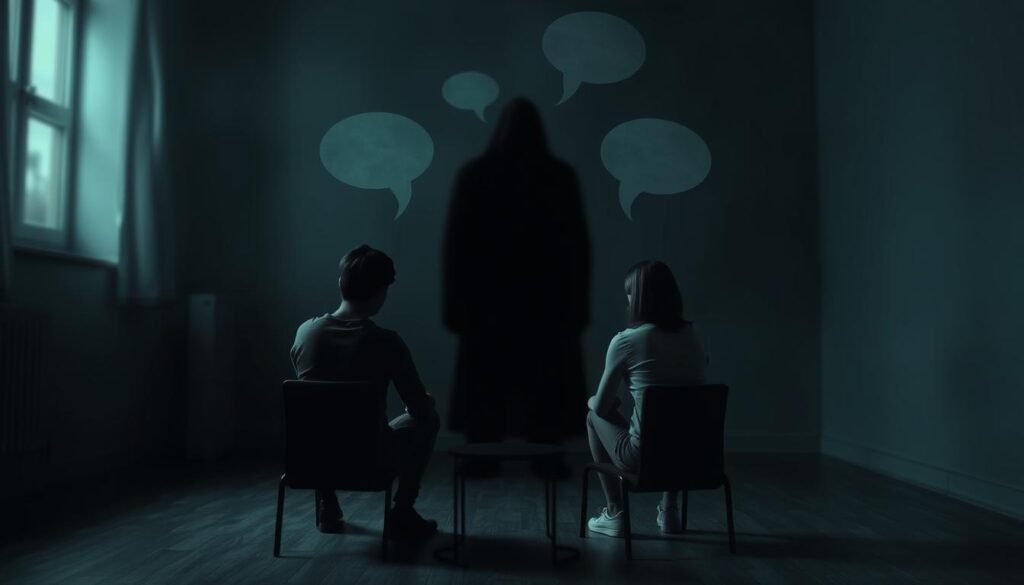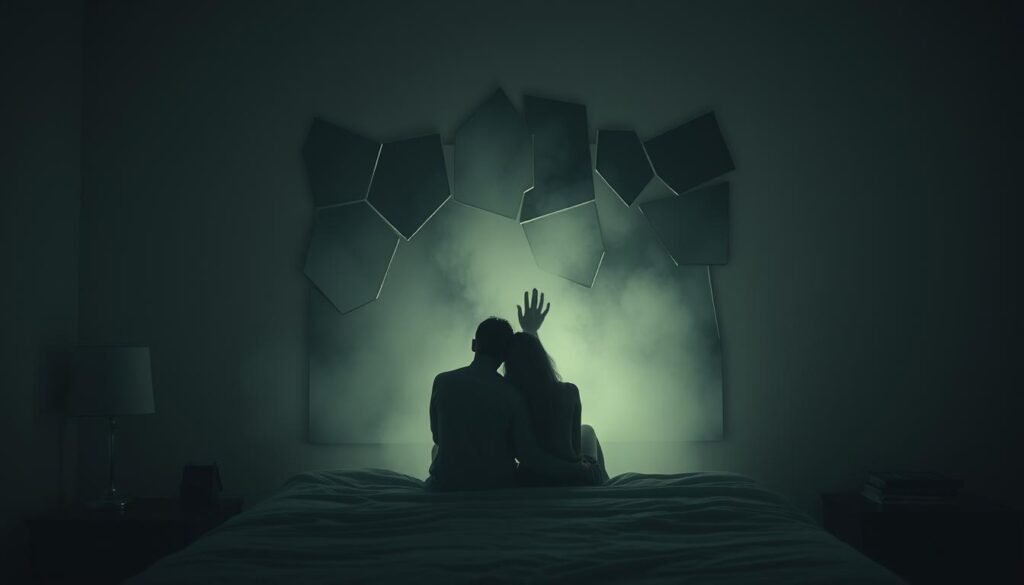Have you thought about how depression changes relationships? In the U.S., about 16.2 million adults face depression each year. It’s not just a personal struggle. It affects their partners too, causing issues like feeling emotionally distant, problems talking to each other, and troubles with being close.
A lot of people suffering from depression, between 65-80%, don’t get the help they need. This makes their connections with others harder. They might pull away from loved ones. This leads to unhappiness and lower relationship satisfaction.
It’s hard to talk to a partner who is depressed. This happens in 70-80% of such relationships. We’re looking into how depression and relationships affect each other. We hope to help people understand and care for each other better.
Key Takeaways
- Depression affects an estimated 16.2 million adults in the U.S. each year.
- Communication difficulties can occur in around 70-80% of relationships where one partner is experiencing depression.
- Approximately 65-80% of individuals with depression do not receive adequate treatment.
- 56-67% of couples experience decreased libido due to depression.
- Engaging in shared activities can reduce the impact of depression on relationships by up to 45%.
- Couples therapy improves communication and understanding in relationships impacted by depression in around 70-80% of cases.
Understanding Depression: A Comprehensive Overview
About 17.3 million adults in the U.S. experience major depressive disorder. This is roughly 7.1% of the adult population. It’s marked by long-lasting sadness and various emotional and physical problems. To be diagnosed, symptoms like feeling hopeless, being very tired, eating more or less than usual, having trouble focusing, and not enjoying activities must last for at least two weeks.
About 1.5% of U.S. adults deal with persistent depressive disorder, which is less severe but lasts at least two years. Other forms of depression include perinatal depression, affecting 1 in 9 women, and seasonal affective disorder, impacting 5% of adults mostly during late fall or early winter.
Depression’s causes are complex, involving genetics, brain chemistry, hormones, and trauma. Having a family member with depression increases your own risk. Each year, only 45% of adults with mental illness get help. This highlights the need for good depression treatments. Therapies like cognitive-behavioral therapy can really help, but they require active participation.
Medicines such as SSRIs and SNRIs are often used for treating depression. Between 70% to 90% of people find these drugs helpful. However, they can take weeks to start working. For those with treatment-resistant depression, doctors might try other methods, like esketamine.
It’s vital to fight the stigma against mental health to support those needing help. Understanding and compassion can greatly improve the lives of those with major depressive disorder.
| Condition | Prevalence | Duration for Diagnosis |
|---|---|---|
| Major Depressive Disorder | 17.3 million adults (7.1%) | At least 2 weeks |
| Persistent Depressive Disorder | 1.5% of adults | At least 2 years |
| Perinatal Depression | 1 in 9 women | Varies (during pregnancy/postpartum) |
| Seasonal Affective Disorder | 5% of adults | Begins in late fall/winter |
Common Symptoms of Depression Affecting Relationships
Depression can show signs in relationships that hurt the connection between partners. Some symptoms are being emotionally distant and having a lower sex drive. These issues make it hard to be close and talk to each other. People might also get easily irritated and lose interest in things they used to enjoy together. This leads to misunderstandings and feeling emotionally apart.
About 5% of adults worldwide deal with depression, and many don’t know they have it. Spotting the effects of depression on intimacy early is key. Those with depression might deal with guilt, not being able to sleep, and losing interest in their hobbies. They may pull away from friends and family. This pulls partners further apart over time.
Noticing these signs early can help stop relationships from getting worse. Talking openly about feelings and what each person is going through is critical. Getting help not only aids in dealing with depression but also strengthens the relationship through better understanding. For more advice, check out important resources.
| Symptoms of Depression | Effects on Relationships |
|---|---|
| Increased irritability | Heightened conflicts and misunderstandings |
| Loss of interest in activities | Reduced shared experiences and bonding |
| Emotional unavailability | Feelings of isolation and lack of support |
| Decreased libido | Negative impacts on physical intimacy |
| Social withdrawal | Limited interactions with friends and family |
Depression and its Impact on Relationships
Depression can create tough situations in relationships. It often leads to a cycle where problems in the relationship make depression worse. The way depression affects a couple’s happiness is significant. Both individuals feel the strain.
Those with depression might pull away emotionally. This leaves their partner feeling alone and worried. This emotional gap can make sadness deepen and hurt the relationship more.
The Cycle of Depression and Relationship Issues
Depression can really change how couples interact. Emotional withdrawal can seem like rejection. The other partner might feel it’s their job to make their loved one happy. This pressure can lead to misunderstandings and hard feelings, pushing them further apart. It’s critical for both to see this cycle. They need to understand depression’s effects to start healing together.
Signs Your Partner May Be Suffering from Depression
Seeing signs of depression early in a partner is key to help them. Look for these signals:
- Persistent sadness or guilt: A big change in mood can point to bigger problems.
- Loss of interest: Pulling away from fun activities or friends could be a clue of depression.
- Changes in sleep patterns: Too much or too little sleep are signs to watch for.
- Emotional distance: Pulling back emotionally can show they’re struggling. It might also affect closeness.
Noticing these symptoms can lead to important talks about mental health. It encourages both partners to get help when it’s needed.
How Depression Alters Communication Dynamics
Depression causes significant communication challenges in depressive relationships. It changes how partners talk to each other. Those with depression might find it hard to share their thoughts and feelings. This can lead to misunderstandings and frustration.
Stress levels go up when communication suffers in a relationship. Often, emotional withdrawal is a sign of depression. One partner might become distant, making the other feel left out or ignored. This lack of connection can also make it tough to understand non-verbal signals, making talking even harder.
It’s important for partners to see when someone is emotionally unavailable. When deep talks become rare, resentment may grow. If communication breaks down, the relationship’s foundation weakens. This can make both partners feel more disconnected.
To deal with depression’s effects, recognizing the stress it causes is key. With patience and empathy, couples can begin to communicate better. Embracing open talks and supporting each other can ease the trouble depression brings to communication.
| Communication Challenge | Impact on Relationship |
|---|---|
| Inability to express emotions | Increases misunderstandings and frustration |
| Emotional withdrawal | Leads to feelings of isolation and neglect |
| Distorted interpretation of cues | Creates confusion and tensions between partners |
| Decline in meaningful conversations | Fosters resentment and emotional distance |
| Lack of communication | Weakens the relationship foundation |
Healing the emotional gap caused by depression demands time and small steps. Learning about how depression affects talking helps in being patient and kind. This is crucial for helping a partner cope with their struggles.

Withdrawal in Relationships: Recognizing Social Isolation
Social withdrawal in relationships can pop up without warning. It’s often linked to mental health issues. For example, those feeling depressed may want to step back from their partners and friends. This behavior comes from different reasons like feeling too tired or hopelessness. It’s important to understand why it happens to maintain a good bond and empathy.
Understanding the Desire to Withdraw
Noticing social isolation in a partner means paying close attention to how they feel. There are many reasons people pull back. Here are a few:
- Emotional Exhaustion: Constant tiredness can make someone want to be alone.
- Fear of Rejection: The worry of being a burden may lead to distancing from others.
- Loss of Interest: When fun activities no longer please, connection can fade.
Implications of Social Withdrawal on Partnerships
The effects of social withdrawal on relationships are significant. If one partner withdraws, the other might feel left out or puzzled. Here’s what can happen:
| Impact | Description |
|---|---|
| Communication Breakdown | Less talking can cause misunderstandings and hard feelings. |
| Increased Loneliness | The withdrawing partner may feel even lonelier, which can worsen depression. |
| Emotional Distance | Pulling away hurts closeness, and intimacy suffers. |
| Risk of Breakup | Lasting isolation can deeply harm the relationship. |
Effects of Depression on Intimacy and Physical Connection
Depression can have a big impact on closeness and physical touch in romantic relationships. Around 280 million people around the world deal with depression. It’s a major reason people struggle in life. This issue can really mess up personal relationships, including the connection with a partner.
Depression often leads to a lower sex drive. It makes partners feel less connected emotionally. They may also feel less attractive. This can make them feel alone, especially if their partner has Major Depressive Disorder (MDD). People with MDD tend to pull away from their loved ones.
To show how depression changes intimacy, here is a table:
| Dimension | Impact of Depression | Potential Solutions |
|---|---|---|
| Libido | Decreased interest in physical intimacy | Open discussions about needs and feelings |
| Emotional Connection | Increased emotional distance, feelings of inadequacy | Engagement in couples therapy |
| Communication | Breakdown in expressing needs and desires | Practicing effective communication strategies |
| Social Interaction | Withdrawal from shared activities | Encourage participation in joint hobbies |
Understanding these changes is key in dealing with depression’s impact on intimacy. Open talks about feelings and worries are crucial. They help couples stay strong and start healing. Strategies like couples therapy can improve their bond. They help couples beat depression’s challenges. Together, they can make their relationship warm and loving again.

Support Strategies for Partners of Individuals with Depression
Helping a partner with depression needs understanding, empathy, and action. It’s key to look after your own mental health too. By talking openly, you cut down misunderstandings and loneliness.
Encouraging Open Communication
Talking honestly about feelings can create trust. This helps both partners share what they’re going through. Checking in often shows continuous support.
Building a Support Network
Getting friends and family involved can lift some weight off your shoulders. Everyone supporting each other makes a strong community. This helps everyone, not just the person with depression.
Self-Care and Establishing Boundaries
Self-care is a must. Doing things for yourself, like exercising or hobbies, is important. Boundaries are crucial for a healthy relationship. They ensure both people stay well and happy.
Watch for signs of trouble, like mood swings or wanting to be alone. Staying alert to these can be a big help. Sometimes, getting a professional’s help is the best step. To learn more about how sleep problems and depression affect each other, click this link.
| Strategy | Description | Benefits |
|---|---|---|
| Open Communication | Discuss mental health openly to express feelings and needs. | Reduces misunderstandings and fosters connection. |
| Support Network | Encourage friends and family involvement for added support. | Creates a sense of community and shared burden. |
| Self-Care | Prioritize personal health through activities and rest. | Prevents feelings of overwhelm and resentment. |
| Boundaries | Set clear limits on emotional involvement and responsibilities. | Maintains a balanced relationship dynamic. |
Coping Strategies for Depressive Episodes in Relationships
Using the right coping strategies during depressive episodes can really help relationships. It’s important to do things that make you feel emotionally better. Mindfulness can help couples talk openly and understand each other better. We’ll look at some ways to deal with depression together.
Integrating Mindfulness and Meditation
Mindfulness and meditation are great for dealing with depression. They help you control your emotions, bringing peace and awareness. These methods, like deep breathing or imagining peaceful scenes, can make you feel closer to your partner. They help you understand each other on a deeper level.
Engaging in Shared Activities
Doing fun things together can help lessen depression and bring you closer. Studies show that being social can make you happier. Whether it’s shared hobbies or new activities, spending time together can fight loneliness and strengthen your bond. Even a short walk can boost your mood for hours. It shows how important daily time together is.
Encouraging Professional Help
Getting help from a professional is a key step in healing. Therapy gives couples ways to talk better and deal with depression’s challenges. The Life Adjustment Team in Los Angeles focuses on what each person needs. Therapy not only provides strategies for dealing with depression but also creates a supportive space. Both partners can feel heard and appreciated. For more tips, check out this useful link.
Rebuilding Emotional Connections After Depression
Recovery from depression requires work and care from both sides in a relationship. Many people pull away because of depression, affecting lots of couples. Openly sharing feelings, needs, and worries is key. Creating a space for honest talks helps greatly in restoring emotional ties.
Trying new things together can boost happiness in a relationship after depression. This could be picking up a new hobby, enjoying nature walks, or joining community activities. Spending quality time together builds stronger connections. It’s important to recognize the struggles during depression to set common goals and strengthen the bond.
Having support from friends and family is key in this healing process. Many feel like a burden, yet some find solace in their close ones. This network of support plays a big role in recovery, helping partners tackle challenges as a team. Seeking expert guidance, like couples therapy focused on emotions, can also greatly improve the relationship.
Reconnecting emotionally after depression takes time. It involves dealing with past hurts and looking ahead together. Being kind and understanding makes a couple more resistant to future challenges. This nurtures a loving and rewarding relationship.
Depression Counseling for Couples: Therapy as a Tool
Couples dealing with depression face a tough emotional journey. Depression counseling for couples is key for recovery. It helps partners understand how depression changes their relationship and personal way of interacting.
The Role of Professional Guidance in Relationships
Professional therapy adds vital support for relationships. Therapists identify depression-related patterns and offer coping strategies. This improves communication. Research shows therapy boosts relationship satisfaction. It helps mental health and relationship quality, whether sessions are in-person or via videoconferencing.
Techniques to Enhance Understanding
Therapists use techniques like Emotionally Focused Therapy (EFT), the Gottman Method, and Cognitive Behavioral Therapy (CBT). Each method works on different relationship areas:
| Therapeutic Approach | Focus Areas | Benefits |
|---|---|---|
| Emotionally Focused Therapy (EFT) | Emotional connection, attachment issues | Increases empathetic understanding |
| The Gottman Method | Conflict resolution, communication skills | Builds relationship resilience |
| Cognitive Behavioral Therapy (CBT) | Thought patterns, behavioral changes | Addresses harmful beliefs affecting the relationship |
Using these methods, couples tackle problems like arguing, intimacy issues, and external stress. This professional therapy for relationship health enhances communication skills, personal growth, and self-awareness.

Understanding Depressive Symptoms in Relationships
It’s crucial to understand depressive symptoms to build healthy relationships. When we spot depression in our partners, we can talk and listen better. This helps us deal with problems more kindly.
Teens who feel more depressed at 15 often fight more in relationships. But those feeling less depressed solve problems better. This shows why it’s key to recognize depression early for healthy relationships.
Depression hits both young people and adults. It makes social interactions tough. This includes getting rejected by friends and clashing with family. Adults with depression face more fights and solve problems less effectively.
Those with depressive symptoms often use negative ways to solve romantic issues. Knowing these signs helps couples talk things out calmly. This avoids making conflicts worse.
Depression can make someone feel really bad about themselves. This hurts how close and supportive they can be with their partner. It shows why it’s so necessary to see depression in our loved ones.
Studies show that divorce rates are higher when one partner is mentally distressed. This shows how deeply depression can affect a couple’s happiness. Recognizing this can lead to help and better ways to support each other.
Conclusion
Talking about how depression affects relationships is very important. It helps keep relationships healthy. Studies show that feeling socially isolated, not having enough support, and having bad relationship quality can make people much more likely to get depressed. This shows how key it is to be aware of mental health. This awareness helps build strong, supportive relationships. When couples understand how mental illness affects their relationship, they create a caring and understanding space.
To tackle depression in relationships, couples should stick together and work on their emotional connection. It’s important to talk openly, seek counseling, and support each other. With about 16% of Americans likely to face Major Depressive Disorder, knowing how to deal with its impact is crucial. This knowledge can improve both the relationship and individual happiness.
Sharing feelings and activities helps couples deal with depression’s challenges. They can also grow closer and more committed to each other. Making mental health a priority and actively managing depression in a relationship leads to a stronger, happier partnership.